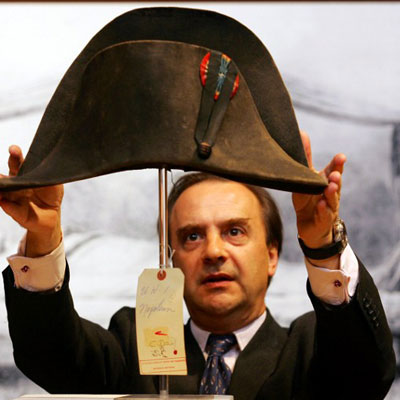Mike Jay has already demonstrated that mental illness is often expressed in the terms of the era in which it’s experienced. In a really smart London Review of Books piece about Laure Murat’s new title, The Man Who Thought He Was Napoleon: Towards a Political History of Madness, Jay writes of Philippe Pinel, a psychiatrist who reshaped and expanded the notion of insanity and its treatments in the wake of the French Revolution, when citizens who went mad often focused their anxieties on the guillotine, with one patient believing he’d been beheaded and subsequently had another victim’s skull attached to his neck.
In 1840, French heads became confused in a different sense, when Napoleon Bonaparte’s remains were laid to rest in an elaborate public ceremony, and soon enough, a quarter of all cases of mental illness in the nation were being diagnosed as delusions of grandeur. An excerpt:
Morbid terror of the guillotine was occasionally recorded in Bicêtre until the 1850s, but by that time it had been usurped by the most celebrated delusion of them all. On 15 December 1840 the remains of Napoleon Bonaparte, rumoured to be miraculously uncorrupted, were taken to the Invalides accompanied by vast crowds and laid to rest in a grandiose imperial ceremony. That same year, Bicêtre admitted at least a dozen Napoleons to its wards.
‘Delusions of grandeur’, of which believing oneself to be Napoleon became the archetype, rose to extraordinary medical and cultural prominence during the July Monarchy. By 1840 it accounted for a quarter of all diagnoses of insanity. It was a form of monomania, the term coined by Esquirol to describe an uncontrolled delusion or obsession (idée fixe) in one who might otherwise appear sane. He conceived it as a disease of the passions, a consequence of ‘self-love, vanity, pride and ambition’, and hence a moral failing as much as a pathology. Mad Napoleons were always irascible and imperious, reciting their interminable compositions, brooking no argument and demanding that everyone submit to their will. Doctors told tales of miraculous cures effected in the Pinelian manner by humouring them, but their blind rages were more commonly addressed with beatings, straitjackets, cold showers and solitary confinement.
During the 1830s monomania became a term of everyday speech, and delusions of grandeur inseparable from the Romantic spirit of the age. The return of Napoleon’s remains catalysed a sense that the era of heroism had passed, the passions of political struggle replaced by bourgeois dullness. Blockbuster novels traded in impossibly heroic narratives, their protagonists adopting grandiose false identities and concealing fateful secrets; Balzac claimed that what Napoleon ‘did with the sword, I will accomplish with the pen’. Characters embarked on fantastic quests that inevitably recalled Don Quixote, whom Esquirol had cited as the perfect example of the monomaniac. For some psychiatrists, ‘the impact of modern novels’ was itself becoming one of the leading causes of madness.Napoleon – who declared during his final years on St Helena that ‘my life is a novel!’ – was the figure in whom reality and fantasy were conjoined. He was the apotheosis of Rousseau’s new man, who had transcended the limits of history and taken his place among the immortals. Unlike any sovereign before or since he was entirely self-made, and thus uniquely compelling to the delusional. A pretender to the monarchy would always remain just that, but a fake Napoleon might through supreme effort of will become the real thing.•

